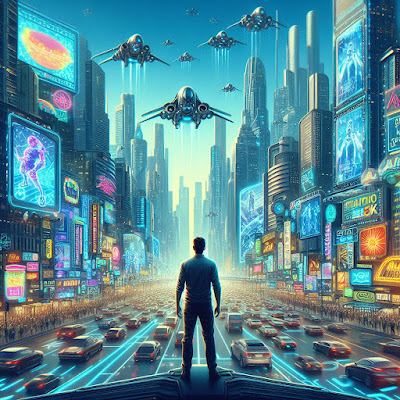In the year 1969, as mankind prepared to take its first steps on the lunar surface, a quiet hum pervaded NASA's Mission Control. Neil Armstrong, strapped into the Apollo 11 lunar module, stared out at the vast expanse of space, the Earth's blue and white marbled sphere shrinking behind him. But this wasn't the first time humanity had aimed for the Moon. There were secrets buried deep within classified government files, secrets that Armstrong had accidentally uncovered.
Back on Earth, a soft whisper buzzed through the intercoms. "Remember, Neil," said a voice he didn't recognize, "there are things up there that are not meant to be seen." Armstrong had dismissed it at first, chalking it up to nerves and static interference. But as the lunar module descended, an uneasy feeling gnawed at him.
When Armstrong and Aldrin finally touched down on the Sea of Tranquility, everything seemed to proceed according to plan. Armstrong's famous words echoed back to Earth, "That's one small step for man, one giant leap for mankind." But as he moved away from the module, a glint of something unnatural caught his eye. There, half-buried in the lunar dust, was a metallic object, far too smooth and symmetrical to be a mere rock.
Curiosity piqued, Armstrong reached down, brushing the dust away. It was a small, cube-shaped device, emanating a faint glow. A strange symbol, resembling a fusion of ancient runes and futuristic script, was etched on its surface. Armstrong's heart raced as he realized this wasn't just a discovery; it was evidence of a presence on the Moon long before humanity's arrival.
He activated the device, and a holographic image flickered to life. It depicted Earth, but not as it was now. Continents were in different shapes, oceans covered lands that were now dry. This was a map of an ancient Earth. Before he could delve deeper, a jarring message appeared: "They are watching."
Suddenly, the Moon's surface trembled. Armstrong looked up to see an enormous structure materializing in the distance, shimmering as if phasing in from another dimension. It was a towering monolith, its surface covered in the same symbols as the device. A voice, deep and resonant, filled his mind. "You are not the first, nor will you be the last. We are the Guardians, and this is not your domain."
Back on Earth, Mission Control watched in horror as the transmission from the Moon became erratic. Armstrong's voice, once calm and steady, now crackled with urgency. "Houston, we have a problem. There's something here... something... alive."
Then, the feed went dead. Panic spread through the control room as engineers and scientists scrambled to re-establish contact. For hours, there was nothing but silence. Then, as suddenly as it had gone, the signal returned. Armstrong's voice was calm, almost too calm. "Houston, this is Apollo 11. We're all fine here. Just a minor technical glitch."
But those who knew Armstrong could hear the subtle undertone of fear in his voice. They knew something had changed. As the lunar module ascended from the Moon's surface, the world celebrated, oblivious to the hidden truth. The Guardians had issued their warning, and humanity's reach had exceeded its grasp. The first Moon landing was not just a leap for mankind, but a step into the unknown, where ancient secrets and cosmic watchmen waited in silence.



